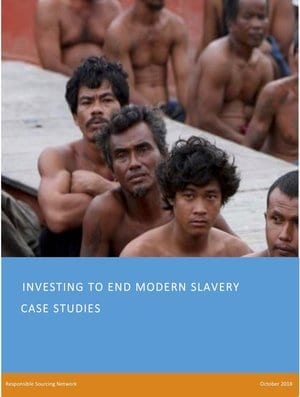
Investing to End Modern Slavery
Modern slavery is so rampant across the globe that twice as many people work under forced labor conditions today, than were brought to the Americas during three centuries of the Atlantic Slave Trade. It is embedded in almost everything we consume, and continues to proliferate in its many forms, such as debt bondage, sex trafficking, prison labor, and forced servitude.2 While little has been done to put an end to human trafficking and modern slavery to date, politicians, lawyers, and the public are finally recognizing its pervasiveness and calling for companies to do their part to put an end to this inexcusable exploitation.
Now is the ideal time to focus, strengthen, and expand investor engagement to make eradication of human trafficking and slavery a top corporate and political priority. Recent modern slavery disclosure regulation and newly-developed benchmarks are making more data on corporate activities available to analysts and investors. This data can be used to inform investment decisions and to spur shareholder advocacy on human trafficking and slavery. Complementing increased investor engagement by the sustainable, responsible, impact (SRI), and faith-based investment communities, is the need to widen and coordinate the scope of investors involved to include large institutional asset owners and managers. An increase in engagement by a wide pool of mainstream investors will send a strong message to corporations that this is a serious material risk and they can no longer sit idly by.
Legislators in the United States and the United Kingdom have passed laws that mandate corporate reporting to address human trafficking and slavery in product supply chains. Media coverage, consumer backlash, class action lawsuits, and a U.S. government-published list of products made by forced labor, are exposing human trafficking as a material corporate financial risk—not just an ethical one.Shareholders have the power to ensure that their investments are not at financial risk due to company ignorance of – or support for – human trafficking and slavery. They have a unique opportunity to halt a major flow of capital that sustains exploitative practices, and direct it toward ethical and empowering employment.Investors also bring a unique and valuable voice to policy debates about how business practices should be regulated to prevent human trafficking.
read the full report here.
